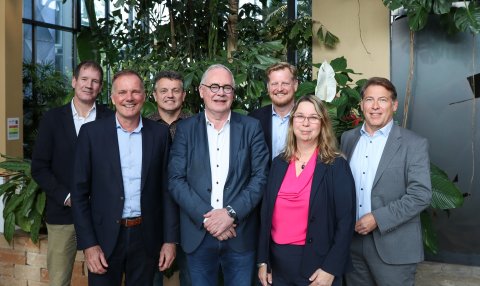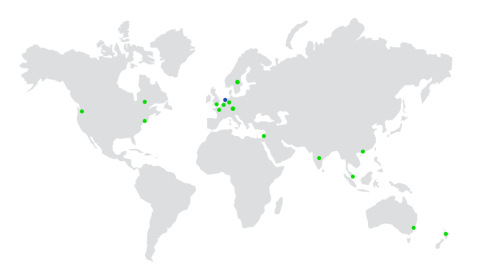
The world of work has changed beyond all recognition in recent years - and so have the demands of managers, employees, and customers. The experience that these stakeholders have come to expect is personalised, holistic, and integrated. In other words, what they expect is a Total Experience.
Unlike when you evaluate the experience in a fragmented manner - looking, say, specifically at customer experience - Total Experience seeks to unify the four areas of experience encountered by any individual in the built environment: customer experience, user experience, employee experience and multiexperience. When these different experience silos are integrated into a single offering, numerous benefits can be unlocked.
It’s no surprise that Gartner named Total Experience as one of its top strategic technology trends for 2022. In fact, by 2026, 60% of large enterprises will use the Total Experience concept to transform their business models and achieve world-class customer and employee advocacy levels.
In keeping with the integrated nature of Total Experience, the advantages it offers are similarly broad and connected with the digital transformation trend that is sweeping organisations across the globe. A 2021 Gartner Digital Business Acceleration Survey found that the top two reasons for pursuing digital initiatives are to enhance customer experiences and to improve employee productivity. A Total Experience strategy can help businesses achieve both these objectives simultaneously - and service providers are set to play a key role.
How can service providers contribute to Total Experience?
Previously, facility service providers predominantly focused on the B2B environment. Hostmanship and hospitality were important, of course, but with an emphasis on operational processes. However, today, Total Experience is pushing service providers to evolve from a B2B approach to more of a B2B2C one.
Mapping the employee or visitor journey on a clear process chart will give you the opportunity to adapt your services by linking them with the right technology. If you're visiting a building, for example, the barrier could automatically open when you arrive in your car, the receptionist could greet you and address you by name, after which you may be offered the use of a cosy lounge to wait in. All this provides you with a great experience. These processes can be structured within one of your business workflows and formally registered so you have the feeling of engaging with an automated qualitative service delivery model.
With the right tools, such as a centralised app, employees and visitors can order lunch, create a service ticket, find their colleagues, book a meeting room or workplace, and much more. And all of this is just a few clicks away.
Customers of facility service providers increasingly demand fully integrated outsourced facility management services - particularly for corporate building environments and international companies. Rather than contracting multiple providers for different services, they expect a single facility service provider to offer quality improvements and cost efficiencies while delivering a complex mix of building operations and maintenance support, as well as additional services like energy management and other sustainability offerings.
And why not go a step further and exceed customer or employee expectations? Facility service providers can offer additional services like those seen in five-star hotels (ironing, dry cleaning, grocery shopping, shoe repair, or a car wash). With a clear product and service catalogue offered by your service desk, employees can access these options anywhere, anytime.
In addition, with the rise of hybrid working that has followed the COVID-19 pandemic, many organisations are undergoing a strategic transformation. For facility managers, this means engaging with different stakeholders, including HR teams, real estate personnel, and IT. As a service provider, this creates opportunities to add value because of the numerous direct touchpoints they have with the employees. They can make sure that the journey employees take to work, the quality of the services they engage with, and the environment they interact with are the best they can possibly be.
Creating a smart workplace is another way of achieving your Total Experience objectives, whether they are around health and safety, occupancy rates, data transparency, business intelligence, prescriptive services, or Facilities as a Service (FaaS). With the Planon Facility Services Business Solution platform, you can combine IoT, BMS, and PropTech solutions to gather all the qualitative data you need to reach the next level of service delivery.
Answering a strategic question
Any transition brings challenges. In this space, the primary one concerns an organisation’s business approach or mindset. If you look at Total Experience from a purely operational angle, you will never achieve it. Facility management has to be at the board or management level to discuss Total Experience - it represents a strategic question that has an impact on employee retention, talent scouting, and operating costs. It involves multiple stakeholders working together. By looking simply at operational performance and cost, Total Experience is impossible.
One strand of Total Experience is multiexperience, integrating multiple lines of communication that have traditionally all been managed separately. Of course, the end-to-end digitalisation of the complete process chain of facility services delivery that this requires can initially add complexity to operations. Other challenges, like uncertainty around ROI, a lack of shared metrics, and employee inertia, can also prevent businesses from creating an experience-driven organisation. Fortunately, all these issues can be addressed with the right software.
Unlocking the benefits of Total Experience
For customers, the benefits of Total Experience are numerous. Integrating services can create a more motivating environment that leads to higher levels of satisfaction and productivity. Hygiene can be improved and even imperceptible nudges can be incorporated, such as encouraging workers to take the stairs rather than the lift, which improves overall company health. Altogether, an integrated FM services approach can deliver up to 45% more value to organisations.
And for facility service providers, Total Experience can make services more accessible, which in turn leads to higher revenues. It can also be used to generate more detailed insights, improving the perception of a service’s quality. It delivers transparency that allows service providers to demonstrate clearly the value they are adding to the built environment.
At Planon, we provide a central platform for facility service providers where they can combine all their processes and workflows. We also add extra dimensions to the Total Experience, allowing them to incorporate IoT sensors, work on their visitor management, leverage various dashboards, and integrate new sustainability solutions.
With our solution, service providers can create huge amounts of added value to cement their relationship with the customer. That’s what Total Experience can deliver and what Planon is ready to support.





















